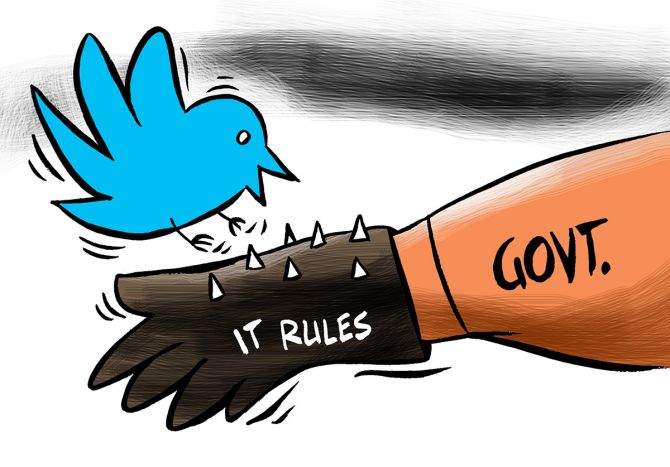The Madras high court on Thursday held that any penal action taken under certain sections of the new IT Rules will be subject to the final orders to be passed on a batch of PIL petitions challenging the same.

"If there is any action taken in terms of Rule 3 of the said Rules read with Rule 7 thereof during the interregnum, it will abide by the result of the petitions and further orders herein," the first bench of Chief Justice Sanjib Banerjee and Justice P D Audikesavalu said.
The bench was passing interim orders on a batch of PIL petitions from carnatic musician T M Krishna, Digital Publishes Association and another individual, challenging the Information Technology (Intermediary Guidelines and Digital Media Ethics Code) Rules introduced in February this year. The petitioners contended that the new rules are ultra vires, inter alia, Articles 14 and 19 of the Constitution.
The Bombay high court, on August 14 this year, had stayed the operation of sub-rules (1) and (3) of Rule 9 of the said Rules of 2021, the bench pointed out.
The petitioners in particular referred to Rule 9 of the said Rules, pertaining to observance and adherence to the Code. Rule 9 (3) provides for ensuring observance and adherence to the Code of Ethics by publishers operating in the territory of India as laid down in the Appendix to the Rules. The grievances made in relation to publishers would be governed by a three-tier structure -- self-regulation by the publishers, self-regulating bodies of the publishers and oversight mechanism by the Central government.
The petitioners were wary of the oversight mechanism of the Centre indicated as the final tier of the process of regulation.
"Prima facie, there is substance in the petitioners' grievance that an oversight mechanism to control the media by the government may rob the media of its independence and the fourth pillar, so to say, of democracy may not at all be there," the bench said.
Nothing more need be said on such aspect of the matter since the Bombay High Court, on August 14 this year, had stayed the operation of sub-rules (1) and (3) of Rule 9 of the said Rules of 2021, the bench pointed out.
The bench further observed that indeed, there may have been no need to pass an independent order.
However, the petitioners submitted that notwithstanding the order passed by the Bombay High Court, which ought to have a pan-India effect, notices have been issued to the petitioners subsequently requiring the petitioners to adhere to, inter alia, the said Rules and Rule 9 thereof. The Additional Solicitor-General accepted that the order passed by the Bombay High Court would have pan-India effect.
The bench had earlier adjourned the matter on the ground that transfer petitions had been filed before the Supreme Court. However, the bench noted that the Apex Court has not passed any order on the transfer petitions or there was any legal impediment to the present petitions being taken up by this court.
The other ground of immediate challenge, which is not covered by the order of the Bombay High Court, pertains to Rules 3 and 7 of the impugned Rules. The petitioners' particular grievance is to the incorporation of sub-clause (x) of Rule 3 (1) (b) which states "is patently false and untrue, and is written or published in any form, with the intent to mislead or harass a person, entity or agency for financial gain or to cause any injury to any person".
The petitioners pointed out that along with the obligation imposed on the intermediary under Rule 3 (1) (c) to terminate the access or usage rights of users for non-compliance with the provisions of Rule 3 (1) (b), the provisions for grievance redressal have been made stringent and, finally, Rule 7 has been incorporated making an intermediary liable for punishment upon the intermediary failing to observe the said Rules.
"Though it is submitted by the Additional Solicitor-General that Rule 3 of the present Rules were on similar lines as Rule 3 of the 2011 Rules, there appear to be key changes, particularly the introduction of sub-clause (x) in clause (b) of sub-rule (1) thereof and the additional obligation on the intermediary in, inter alia, clause (c). Any host of a website or platform would be an intermediary and an ordinary person may be denied access to the platform on the ipse dixit of the intermediary or on the intermediary's apprehension that such intermediary may be proceeded against.
The judges also noted that Sec. 79 of the original Information Technology Act, 2000 grants exemption from liability to intermediaries in certain cases. However, by virtue of Section 79 (2) (c), the exemption would not apply if the intermediary is found not to have observed "guidelines as the Central Government may prescribe in this behalf."
"In the light of the Supreme Court judgment, wherein Sec. 79(3)(b) of the Act has been read down and it has observed therein that unlawful acts beyond what is laid down in Article 19(2) of the Constitution obviously cannot form any part of Section 79 of the Act, there is substantial basis to the petitioners' assertion that Article 19 (1) (a) of the Constitution may be infringed in how the Rules may be coercively applied to intermediaries," the bench said.
Indeed, the Supreme Court had also observed that it would be very difficult for intermediaries like Google, Facebook, etc. to act when millions of requests are made and the intermediary is then to judge as to which of such requests are legitimate and which are not. Though the petitions have not been brought by hosts of website platforms, social media platforms on the website are used by one and sundry and there is a genuine apprehension, as the petitioners' suggest, that a wink or a nod from appropriate quarters may result in the platform being inaccessible to a citizen, the judges said and added that accordingly, if there is any action taken in terms of Rule 3 of the said Rules read with Rule 7 thereof during the interregnum, it will abide by the result of the petitions and further orders herein.
The bench adjourned the matter till October 27, as it was told that the petitions pending before the Supreme Court would be taken up for hearing in the first week of October.










